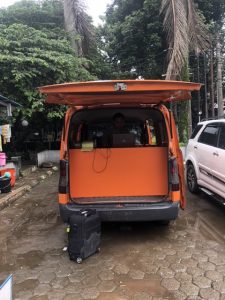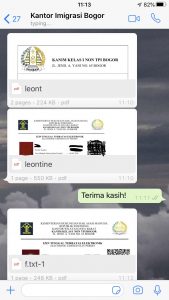Permit Race
Getting all the documents and permits done for Indonesia always feels a bit like a computer game, like a race where you need to pick up different trophies to be allowed to go to the next level. Level one starts months before you head out to Indonesia, gathering together a large packet of documentation (passports, bankaccount-statements, proposals, letters from various counterparts, various forms, and I could go on and on).
Once that’s received by the Ministry of Research and Technology, our main counterpart has to give a presentation on our proposed work and answers questions to a committee in Jakarta. Once that approval is in, a letter is sent to the immigration office in Jakarta. Then we wait. Typically just one week before you have to leave, a scan of a ‘Teleks’ arrives in your inbox and with this we go to the Embassy in The Hague. Five days later we pick up the passports and fly to Indonesia.
That’s when Level 2 starts and the race really begins. Land on Sunday evening, the very next day at 8:30 we arrive at the 20th floor of the Ministry of Research & Technology Building, in the center of Jakarta. Here’s a little office for Foreign Research Permits. Ibu Yetti welcomes us and takes all our documents, our profile pictures with red background, and prepares our research permit. But that’s not where it ends. She gives us a pile of folders with other letters to give to four different offices, for the final Level 3.

Payments are done in mobile post-office vans outside of the offices. You pay the man in the orange van in cash and he electronically transfers it to the office
Here is where there are a few parameters to consider: we need to get all the documentation to the right offices and everything done by Friday 11Am, most offices close by 3pm, and to makes things fun the offices are spread across Jakarta – a city with notoriously terrible traffic, where one can spend an hour driving 5 km. And yes, there are regular ‘system problems’ meaning that nothing can be registered that day.
After 100s of pages of documentation, all fingers printed, green folders, pink folders, red folders, taxis, Transjakarta busses, ojeks, visiting four different ministries, two cities, and a lot of help from our counterparts, we get it all done in four days! One thing that was new for me: we got our temporary residency permit by WHATSAPP! No booklet, no paper, just a whatsapp message. Wonderful that all that paperwork transforms into digital efficiency.
The payments are also remarkable. They are done in mobile post-office vans outside of the offices as a substitute for electronic payments. You pay the man in the orange van in cash and he electronically transfers it to the office. Works incredibly smoothly.
And remember, always, always fill in forms in BLACK ink. Not BLUE. Pictures must be with a RED background. And don’t ask why.

We got our temporary residency permit by WhatsApp

